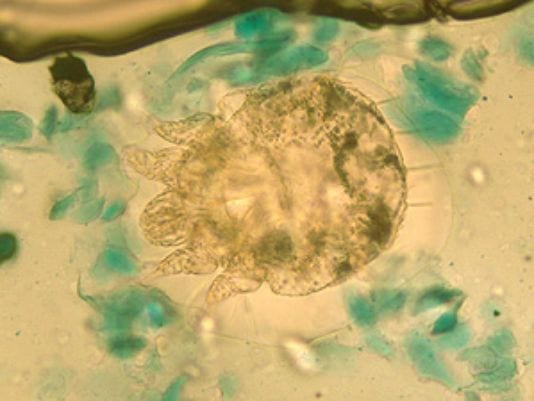Inmates Forced To Keep Quiet About Scabies Outbreak
After a scabies infestation at the Metro-Davidson County Detention Facility, operated by the Nashville based private prison, CoreCivic, its female inmates were forced to keep quiet. They were warned that they would immediately be transferred to solitary confinement if they mentioned anything about the rash or feeling itchy. They attempted to inform family members over the phone and asked their family to research the infestation on their behalf, but their calls were monitored and the staff made good on their word. The inmates call privileges revoked. They were coerced into silence and forced to live with the parasite.
A 21-page lawsuit was filed by attorney Gary Blackburn, finally, on their behalf, which details allegations of the threats if inmates didn’t stay quiet, retaliation and denial of medical treatment. It is seeking class action status for all female inmates who suffered from the outbreak and were forced to remain quiet or who will suffer. The parasite infected all inmates at the 1,300-bed facility as well as many courthouse employees. At least, CoreCivic denied treatment for the inmates as word began to spread and downplayed the severity of the situation when asked about it by those in positions of authority, including judges and lawmakers.

Republican John Ray Clemmons requested Metro council investigate whether the case proves CoreCivic breached its contract regarding jail services. “As you are well aware, this is only the latest incident in a consistent pattern of alleged failures and negligent conduct by (CoreCivic) with respect to the provision of appropriate safety and health care services at (CoreCivic) facilities nationwide, including the Metro Detention Facility,” said Clemmons. “While I understand that certain council members have or will be conducting hearings on related issues, the current situation presents you with an opportunity to take a more comprehensive look at the contract and Metro’s long-term relationship with (CoreCivic).”
A spokesperson for CoreCivic insisted that care for its inmates and staff had always been important, and it hadn’t encouraged anyone to stay quiet. “While we don’t comment on pending litigation, the health and safety of our staff, community and those entrusted to our care is our top priority,” said CoreCivic spokesman Jonathan Burns. “The Davidson County Sheriff’s Office and the Metro Public Health Department were notified of this issue from the start, and they have been engaged every step of the way. In situations like this, we work hard to follow all protocols and guidelines to mitigate the issue.”

By the time word got out, however, not only were hundreds of inmates receiving treatment, but the parasite had infested everyone in the building and had spread to attorneys and staff at Nashville’s courthouse. Concern over the spread of the mite delayed some of the court’s hearings, including a murder trial. “They knew about a rash for a long time and downplayed it, minimized it and dismissed people who were suffering as out of hand complainers,” said Public Defender Dawn Deaner. Pre-trial detainee, Jennifer King, who first noticed she was infected back in January, was denied treatment “pursuant to (CoreCivic’s) official policy, custom, and practice of ignoring requests for medical attention,” according to the lawsuit. By the time King was transferred to a different housing unit approximately four months later, she was “covered from head to toe with the visible rash.”
Metro Health Department officials didn’t learn of the parasite until halfway through the month of May. Wendy Snead, an inmate, called a family member and begged them to inform department. Snead was taken May 19 to a skin specialist in Franklin who diagnosed scabies and prescribed treatment. However, when she returned to her dwelling, she was not allowed to continue treating the rash. “(Snead was) then placed in segregation without food, a mattress or any of her personal belongings for many hours. She was not allowed to call her family,” according to the lawsuit. “(CoreCivic’s) retaliation towards Plaintiff was intended to intimidate (Snead) and other inmates from filing grievances, seeking outside medical treatment, or otherwise reporting the scabies outbreak to individuals outside of (CoreCivic’s) facility.” The inmates want CoreCivic to immediately provide treatment to anyone at the facility suffering from scabies. They are also seeking monetary damages for pain and suffering.
Sources:
Lawsuit: Nashville inmates threatened with solitary confinement if scabies outbreak mentioned
New lawsuit: Nashville jail ignored scabies outbreak as disabled inmates suffered


Join the conversation!